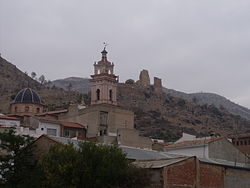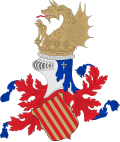This article needs additional citations for verification .(April 2024) |
Gestalgar | |
|---|---|
 | |
| Coordinates: 39°36′18″N0°50′4″W / 39.60500°N 0.83444°W | |
| Country | |
| Autonomous community | |
| Province | Valencia |
| Comarca | Los Serranos |
| Judicial district | Llíria |
| Government | |
| • Alcalde | Rafael Pardos Peiró |
| Area | |
• Total | 69.7 km2 (26.9 sq mi) |
| Elevation | 200 m (660 ft) |
| Population (2025-01-01) [1] | |
• Total | 587 |
| • Density | 8.42/km2 (21.8/sq mi) |
| Demonym | Gestalguino/a |
| Time zone | UTC+1 (CET) |
| • Summer (DST) | UTC+2 (CEST) |
| Postal code | 46166 |
| Official language(s) | Spanish [2] |
| Website | Official website |
Gestalgar (Valencian : Xestalgar) is a municipality of the comarca of Los Serranos in the Valencian Community, Spain. The predominant local language in the municipality is Spanish, not Valencian. [3] [2]


